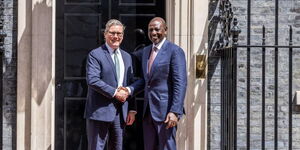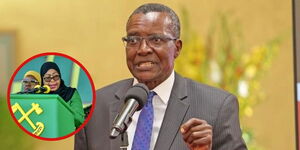Kenya stands to incur considerable losses if it loses its Major Non-NATO Ally (MNNA) status with the United States, after it emerged that US legislators were questioning this status.
Kenya secured MNNA status during the Joe Biden administration, when President William Ruto made a state visit to Washington in May 2024 - the first such visit in 15 years.
This designation was viewed as a reward for Kenya's counterterrorism cooperation and its support for Western nations in emerging global conflicts.
According to reports, more than a year later, US lawmakers were questioning whether Nairobi still deserves the title, with the concerns coming in an August congressional amendment.
The amendment, introduced by US Senator James Risch, includes seven key areas for review, ranging from Kenya’s role in countering violent extremism and contributing to peacekeeping in Africa and Haiti, to its military and security engagements with countries like China, Russia, and Iran.
The move comes as a direct response from the US to Kenya's continued ties with superpowers like China, who have been embroiled in tariff wars with the United States for months.
A new law has now directed the Secretary of State, in coordination with other officials, to initiate a formal review of Kenya's non-NATO status within 90 days of the act's enactment, with the US Congress expected to present its report within 180 days.
The review is expected to be thorough, with key areas set to be scrutinised including the military and security relationship between Kenya and countries like China and Russia.
Further, the review is set to assess the relationship between Kenya and the US on matters such as countering violent extremism, peace missions in sub-Saharan Africa and Haiti and Kenya's role as an economic partner.
If Kenya's designation as a major non-NATO ally (MNNA) is revoked, Ruto's government could be set for adverse repercussions, with one of the most significant ones being losing the eligibility for loans of material, supplies, or equipment for cooperative research, development, testing, or evaluation.
Currently, Kenya can easily enter into agreements with the United States for cooperative training on a bilateral or multilateral basis, with the US covering its costs, if the non-NATO ally status is revoked, this privilege would also disappear.
Losing the MNNA status would also hurt Kenya's ability to acquire surplus equipment as the country is currently eligible for priority delivery under Section 516 of the Foreign Assistance Act.
Kenya is also at risk of losing consideration for the purchase of depleted uranium ammunition, which is crucial for tank armour and projectiles.
In addition, Kenya would lose the privilege to bid on contracts for maintenance, repair or overhaul of US Department of Defence equipment outside of the United States.
Amid concerns of the effects of Kenya losing its Non-NATO ally status, Foreign Affairs PS Sing'Oei moved to reassure Kenyans that there was little to worry about, reiterating that the issues raised in the US Congressional bill would be "comprehensively addressed" while taking into account Kenya’s sovereignty and national interests.












